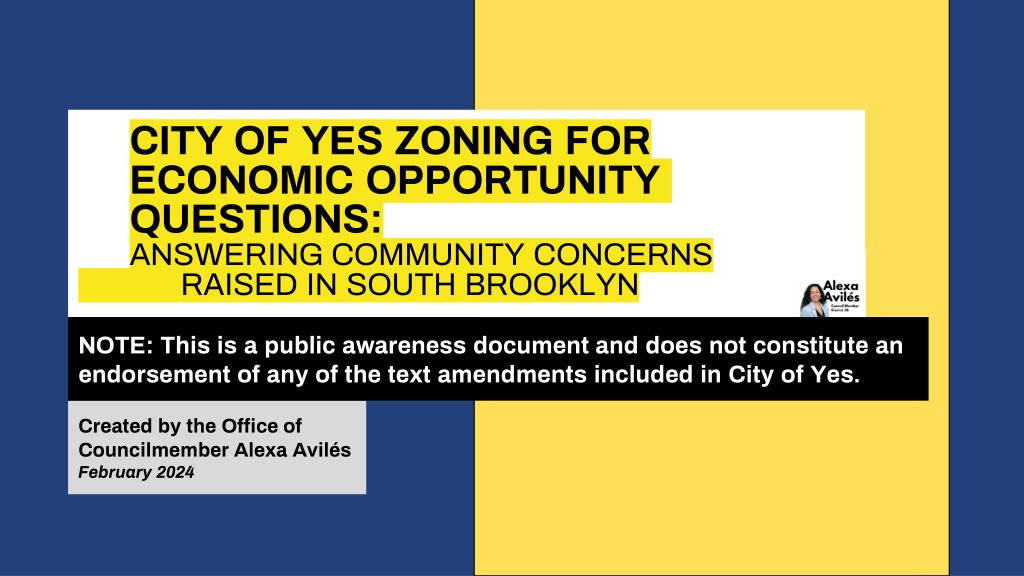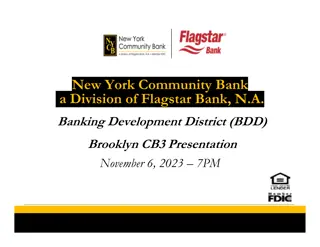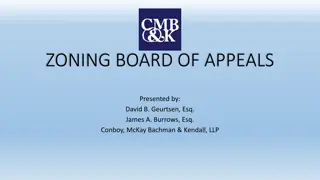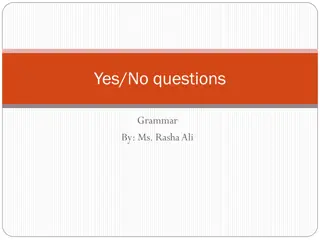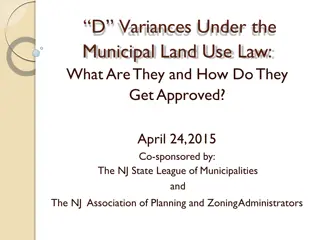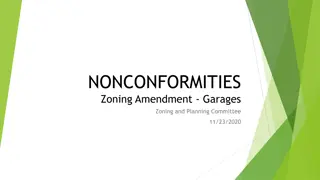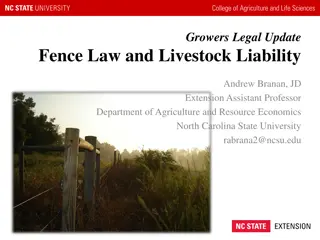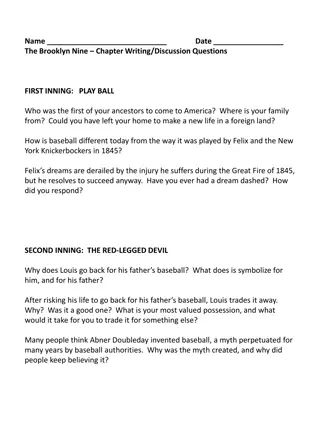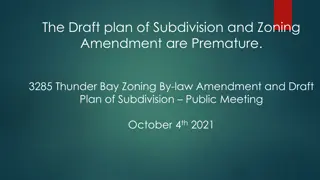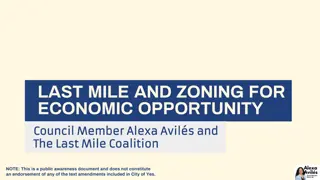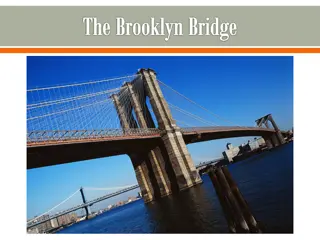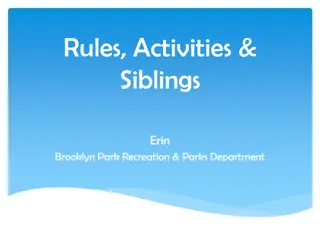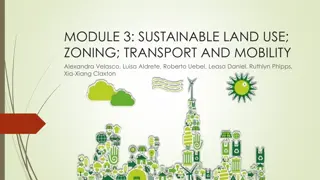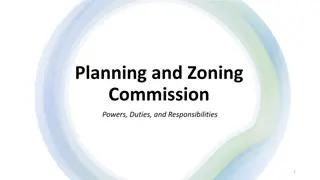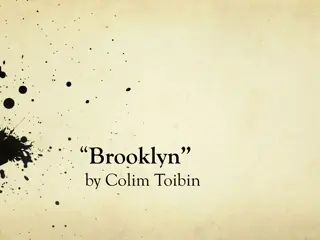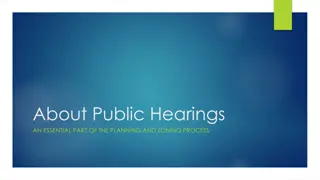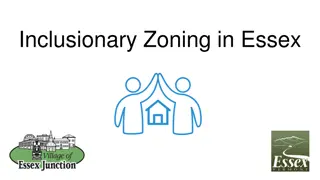Understanding City of Yes Zoning for Economic Opportunity in South Brooklyn
The City of Yes initiative aims to amend zoning regulations to promote sustainability, support small businesses, and create affordable housing across the five boroughs. Community concerns in South Brooklyn regarding potential power shifts from Community Boards and the City Council are addressed, along with clarifications on how zoning affects businesses and manufacturing safety near residents.
Download Presentation

Please find below an Image/Link to download the presentation.
The content on the website is provided AS IS for your information and personal use only. It may not be sold, licensed, or shared on other websites without obtaining consent from the author. Download presentation by click this link. If you encounter any issues during the download, it is possible that the publisher has removed the file from their server.
E N D
Presentation Transcript
CITY OF YES ZONING FOR ECONOMIC OPPORTUNITY QUESTIONS: ANSWERING COMMUNITY CONCERNS RAISED IN SOUTH BROOKLYN NOTE: This is a public awareness document and does not constitute an endorsement of any of the text amendments included in City of Yes. Created by the Office of Councilmember Alexa Avil s February 2024
BACKGROUND: BACKGROUND: CITY OF YES AND THE ECONOMIC OPPORTUNITY AMENDMENT
BACKGROUND: CITY OF YES AND THE ECONOMIC OPPORTUNITY AMENDMENT The Mayor s City of Yes initiative The Mayor s City of Yes initiative seeks to amend zoning regulations to promote sustainability, support small business, and create affordable housing across the five boroughs. The Department of City Planning (DCP) is currently in the second phase: Zoning for Economic Opportunity for Economic Opportunity Zoning The Economic Opportunity text amendment began review in October 2023. Community Boards and Borough Presidents have offered their recommendations, and the CPC held a public hearing in January. For more on the City of Yes proposal and timeline, please visit our website visit our website.
ZONING FOR ECONOMIC OPPORTUNITY QUESTIONS AND ANSWERS
COULD THESE CHANGES TAKE AWAY POWER FROM COMMUNITY BOARDS AND THE CITY COUNCIL?
COULD THESE CHANGES TAKE AWAY POWER FROM COMMUNITY BOARDS AND THE CITY COUNCIL? Zoning is meant to provide rules for what types of businesses can locate where. If a business s use fits what is allowed, it is considered as of right, like commercial uses in commercial districts. Sometimes, the location of uses can be contingent on certain conditions, like their overall size. Sometimes uses are only by special permission, like an arena, which is where community boards, the City Planning Commission, and the City Council weighs in. The vast majority of City of Yes for Economic Opportunity changes do not change that The vast majority of City of Yes for Economic Opportunity changes do not change that framework and are meant to provide clarity, rather than changing who is allowed to framework and are meant to provide clarity, rather than changing who is allowed to grant permission. grant permission.
ARE MANUFACTURING BUSINESSES SAFE TO BE NEAR RESIDENTS? HOW IS ZONING ENSURING THEY WON T CREATE NOISE OR POLLUTION?
ARE MANUFACTURING BUSINESSES SAFE TO BE NEAR RESIDENTS? HOW IS ZONING ENSURING THEY WON T CREATE NOISE OR POLLUTION? When the Zoning Resolution was created in 1961, policymakers intended C1 and C2, and C4-C6 districts to have similar purposes. Despite their different regulations, even then but especially now, these districts were not seen to have meaningful distinctions. For example, C1 districts were meant to be for business types with frequent access such as retail, but this did not anticipate the economy s shift to more local service businesses, experiential and amusement businesses, and improvements in technology that enabled clean maker-retail and small production businesses.
COULD THE AMENDMENT INCENTIVIZE LANDLORDS TO CONVERT EXISTING HOUSING UNITS INTO NON-RESIDENTIAL USE?
HOW DOES THE AMENDMENT ADDRESS THE POTENTIAL FOR SAFETY OR NOISE CONCERNS IN BUILDINGS WITH BOTH COMMERCIAL AND RESIDENTIAL USE? Nothing in zoning prevents those spaces from converting to residential use, Nothing in zoning prevents those spaces from converting to residential use, but conversion can be cost prohibitive or physically impossible but conversion can be cost prohibitive or physically impossible if the space lacks sufficient windows, kitchens, or full bathrooms. By allowing these spaces to re-tenant with a wider range of businesses, DCP can reduce vacancies, and believe that just like in places where 2nd story is already allowed the physical requirements create a major obstacle to conversion in existing buildings.
HOW DOES THE AMENDMENT ADDRESS THE POTENTIAL FOR SAFETY OR NOISE CONCERNS IN BUILDINGS WITH BOTH COMMERCIAL AND RESIDENTIAL USE?
HOW DOES THE AMENDMENT ADDRESS THE POTENTIAL FOR SAFETY OR NOISE CONCERNS IN BUILDINGS WITH BOTH COMMERCIAL AND RESIDENTIAL USE? DCP s proposal would enable big buildings in higher density areas to adapt over time e.g. allow buildings to convert and have both commercial and residential together in the same building, and in whatever order makes sense. It would also allow for pre-existing 2nd story medical space to be occupied by a wider range of businesses. There are many protections in place for residents of buildings with commercial uses, including the requirement for complete separation this means different elevator banks, entrances, and lobbies for residential and non-residential parts of a building. Potentially noisy uses must also separate or attenuate.
HOW WILL THE GROWING OF CANNABIS BE CONTROLLED?
HOW WILL THE GROWING OF CANNABIS BE CONTROLLED? The New York State Office of Cannabis Management regulates the legal cultivation of cannabis. There are several steps a prospective business must follow in order to legally locate a cannabis cultivation business, including appearing before a Community Board. You can find out more information You can find out more information about the process at www.cannabis.ny.gov. about the process at www.cannabis.ny.gov. As far as zoning for cannabis cultivation is concerned, current zoning considers cannabis cultivation to be an agricultural use and therefore currently allowed indoors in Manufacturing Districts or within in a greenhouse or outdoors in a Commercial or Manufacturing District.
DOES THE TEXT AMENDMENT ALLOW DISPENSARIES IN MY NEIGHBORHOOD?
DOES THE TEXT AMENDMENT ALLOW DISPENSARIES IN MY NEIGHBORHOOD? No. No. Zoning does not differentiate between types of shops, either before or after these City of Yes changes. The state is in the process of granting licenses for legal dispensaries, and the city and state have announced a variety of measures to crack down on unlicensed stores.
WHY IS IT A GOOD IDEA TO ALLOW BUSINESSES IN PEOPLES HOMES?
WHY IS IT A GOOD IDEA TO ALLOW BUSINESSES IN PEOPLES HOMES? Many New Yorkers today are neighbors to a home-based business (known as a home occupation in the Zoning Resolution). In fact, state Department of Labor data estimates more than 76,000 businesses already exist in NYC Labor data estimates more than 76,000 businesses already exist in NYC registered to locations in Residence Districts. registered to locations in Residence Districts. In fact, state Department of The zoning today permits a wide range of home-based businesses including but not limited to lawyers, music teachers, and jewelry-makers and has a number of safeguards in place to limit any nuisances that may arise from the number of safeguards in place to limit any nuisances that may arise from the home occupation. home occupation. a
HOW WILL CONFLICTS BETWEEN NIGHTLIFE BUSINESSES AND RESIDENTIAL QUALITY OF LIFE BE ADDRESSED?
HOW WILL CONFLICTS BETWEEN NIGHTLIFE BUSINESSES AND RESIDENTIAL QUALITY OF LIFE BE ADDRESSED? Zoning today uses a 200-person threshold for defining small versus large nightlife venues, with musical entertainment within bars or restaurants allowed at 200 people or fewer in any Commercial District. The proposal would keep all existing capacity limitations, and lobby and distancing regulations in place, while allowing non musical entertainment (i.e. comedy and open mic nights) as well as dancing to occur in the same spaces where musical entertainment is already allowed.
WILL THESE ZONING CHANGES LEAD TO STRIP CLUBS OPENING IN MY NEIGHBORHOOD?
WILL THESE ZONING CHANGES LEA TO STRIP CLUBS OPENING IN MY NEIGHBORHOOD? No. No. What they city calls nightlife pertains to bars and restaurants that have dancing. Strip clubs are considered adult uses under zoning and are only permitted in very limited locations in the city. The city is not changing that.
DOES THE DEFINITION OF AMUSEMENTS INCLUDE CASINOS?
DOES THE DEFINITION OF AMUSEMENTS INCLUDE CASINOS? No. No. Amusements does not mean casinos. A separate citywide text amendment has been introduced regarding gaming facilities and nothing in City of Yes would allow them.
THE AMENDMENT PROHIBITS Offensive noise, vibration, smoke, dust or other particulate matter, odorous matter, heat, humidity, glare, or other objectionable effects. HOW DOES THIS GET ENFORCED? WHO DETERMINES WHAT IS objectionable? IF NEIGHBORS ARE SUBJECT TO NOISE FROM THE BARBER NEXT DOOR. WHO DO THEY CALL?
THE AMENDMENT PROHIBITS Offensive noise, vibration, smoke, dust or other particulate matter, odorous matter, heat, humidity, glare, or other objectionable effects. HOW DOES THIS GET ENFORCED? WHO DETERMINES WHAT IS objectionable? IF NEIGHBORS ARE SUBJECT TO NOISE FROM THE BARBER NEXT DOOR. WHO DO THEY CALL? Today and in the future, if home-based business generates any noise, vibration, smoke, dust or other particulate matter, odorous matter, heat, humidity, glare, or other objectionable effects (i.e. nuisances), the home business can be reported to DOB via 311, DOB borough offices, or referrals business can be reported to DOB via 311, DOB borough offices, or referrals from other City agencies including HPD, DOHMH, FDNY, and NYPD. DOB can from other City agencies including HPD, DOHMH, FDNY, and NYPD. DOB can issue zoning violations to a building owner where a home occupation is issue zoning violations to a building owner where a home occupation is violating the zoning violating the zoning, including fines and potentially shut down the business. the home- -
DOES THE TEXT AMENDMENT REGULATE EXISTING AUTO REPAIR BUSINESSES? COULD IT LEAD TO AN EXPANSION OF WHERE THEY ARE ALLOWED TO LOCATE?
DOES THE TEXT AMENDMENT REGULATE EXISTING AUTO REPAIR BUSINESSES? COULD IT LEAD TO AN EXPANSION OF WHERE THEY ARE ALLOWED TO LOCATE? The requirement would not affect existing businesses. The requirement would not affect existing businesses. For new businesses, the city wants to make sure that the kinds of activity in neighborhood streets are appropriate and that auto repairs can be contained within the zoning lot and not spill over onto sidewalks. To implement this, any new auto use would be permitted on commercial streets only by a special permit process of the BSA. This is a considerable new level of review unlike most other parts of City of Yes.
WHY IS IT A GOOD IDEA TO ALLOW COMMERCIAL BUSINESSES IN RESIDENTIAL AREAS? WOULD THIS END THE DIFFERENCE BETWEEN COMMERCIAL AND RESIDENTIAL ZONING?
WHY IS IT A GOOD IDEA TO ALLOW COMMERCIAL BUSINESSES IN RESIDENTIAL AREAS? WOULD THIS END THE DIFFERENCE BETWEEN COMMERCIAL AND RESIDENTIAL ZONING? Our actual built environment is not that binary Our actual built environment is not that binary mixed have been a part of New York as long as we have been a city have been a part of New York as long as we have been a city. Literally thousands of businesses exist today in Residence Districts, and make life more pleasant and convenient for New Yorkers who need to run down the block for a gallon of milk or pick up a bacon egg and cheese in the morning. mixed- -use neighborhoods use neighborhoods What the city is proposing is not a blanket green light for new businesses. The city is proposing to create what s called an authorization, which would still require a site specific environmental review and community board review.
LET US KNOW WHAT YOU THINK! EMAIL US WITH THE SUBJECT LINE CITY OF YES THOUGHTS TO DISTRICT38@COUNCIL.NYC.GOV
LINKS TO RESOURCES CITY OF YES CITY OF YES WEBSITE WEBSITE ECONOMIC OPPORTUNITY TEXT AMENDMENT ECONOMIC OPPORTUNITY TEXT AMENDMENT WEBSITE WEBSITE TIMELINE TIMELINE CREATED BY THE OFFICE OF COUNCIL MEMBER ALEXA AVIL S CREATED BY THE OFFICE OF COUNCIL MEMBER ALEXA AVIL S
